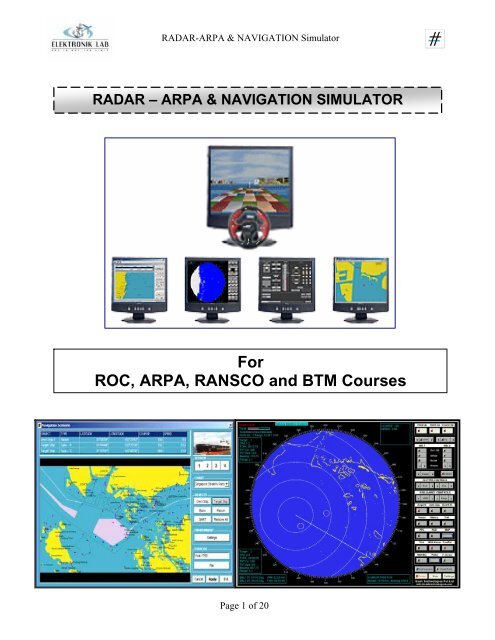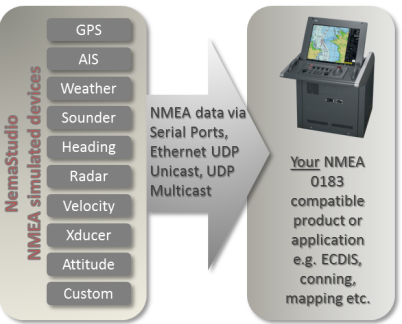SPx Radar Simulator provides intuitive graphical controls for its operation and for scenario creation, as well as a built-in radar display to show the simulated radar video and targets, on top of a map underlay. Targets may be defined at static locations or configured to follow user-defined motions (paths). The simulated radar origin may also be fixed at a static location or set to follow a user-defined motion. The Simulator provides graphical tools for the creation of targets and motions, allowing complex scenarios to be created and visualised with ease.

In addition to the synthetic radar video, navigation data and target data are available as separate outputs on the network. This allows SPx Radar Simulator to be used as a powerful test and development tool for real-world client radar display applications. Conversely, SPx Radar Simulator can also accept external data, for example from an existing simulation system, using this information to build the scenario and generating the corresponding radar video. Navigation data, target tracks, AIS and ADS-B feeds may all be input into SPx Radar Simulator. The application even allows you to augment a real radar video recording or network radar video input with additional, artificial targets.
Marine Radar Training Simulator. Gain years of marine radar experience in just days or weeks with this realistic training simulator, which is the approved software for teaching the RYA marine radar training course. Experience a choice of radar sets, detailed terrain and ship models. Create new scenarios for unlimited practice. AIS, ECDIS, NMEA navigation simulation software for nautical instruments and targets like AIS, GPS, heading, depth, velocity, wind, radar.
The Simulator is able to generate raw primary video, SSR (IFF) video or MTI video for each radar that it is simulating. This means that the program can be used across a broad range of industries, from naval and maritime through to security and air surveillance. Typical applications of the Simulator include:
- testing/development of radar display systems
- tracker configuration
- operator training
- radar location survey
- qualification testing
- Marine radar simulation free download. ATC-pie ATC-pie is an air traffic control simulation program. It features solo, multi-player and teacher-stu.
- Ecdis simulator free download. System Utilities downloads - Transas ECDIS Demo by Transas Ltd. And many more programs are available for instant and free download. Transas ECDIS Demo is a software designed to help the user determine naval routes, measure distances, make naval trading routes, using gps and maps.
Realistic Synthetic Radar Video
SPx Radar Simulator is capable of generating highly realistic radar returns, from multiple radar sources, based on a set of terrain elevation data and user target definitions. The application uses altitude, beamwidth and pulse length considerations in its calculations, to create a convincing radar video image. Simulated sea clutter, as well as target RCS and radar sensitivity settings all contribute to the realistic dynamic appearance of the radar video.
SPx Radar Simulator utilises terrain elevation data from NASA's 'Shuttle Radar Topography Mission' (SRTM). This data set covers most of the world's landmass, with an accuracy of 3 arc-seconds in latitude and longitude. Alternatively, if you have a set of DTED data that may be used by the Simulator instead. The terrain data is used to calculate radar returns from land for a given platform position. The calculation of radar returns can optionally take into account the line-of-sight along each azimuth, so that land or targets that are obscured by terrain at shorter ranges are not displayed.
Additionally, real radar data (either from a live source or recording) may be passed into the Simulator as an auxiliary input and supplemented with entirely artificial data that the software is generating. This makes extremely realistic simulations possible. For example, the injection of rogue target into real radar video to test the reactions of an operator or the behaviour of a tracker.
Scenario Definitions
SPx Radar Simulator allows the user to define complex trajectories that targets or the radar platform itself may then be set to follow. These motions may be created and edited graphically, using the mouse in the display window. Alternatively, motions may be created by specifying their heading, speed and acceleration (linear or angular) directly within a configuration file.
Once defined, a motion may have several targets associated with it, separated in time or by a fixed offset and with optional positional noise added. This can be useful for building up simulations where many targets follow a prescribed route (e.g. airport runways, vessel traffic channels, roads or railways).
The Simulator will also accept platform navigation data, target track data, AIS data or ADS-B data as external inputs, using them as the basis for creating artificial radar video returns. This facility makes it possible to drive the Simulator from real data (possibly replayed) or from an external scenario generator.
Multiple Radar Simulations
SPx Radar Simulator supports multiple user-defined radar sources within a single simulation. Each radar source may be positioned at a different geographic location and a common set of target definitions used to create simulations of whole real-world installations. The view of the targets and the terrain from each radar is considered separately, so that it accurately reflects each radar's perspective on the scenario.
Typically, VTS, coastal surveillance and security applications may require installation of multiple radars along a stretch of coastline or around a perimeter or border. By supporting multiple radars, SPx Radar Simulator can provide application developers and system integrators working in these fields with a valuable realistic test source during the design and development phase.
Shaped Targets and Buildings
As an alternative to defining targets by their length and breadth, they may be defined as complex polygons instead, allowing the user to create simulations of very high resolution radars (for example airport surface movement radars) which more accurately reflect the returns that may be expected from a real radar. As with rectangular targets, shaped targets may be static or may be configured to follow a motion. In the case where a shaped target follows a motion, it is rotated as required to present the correct aspect to the radar.
Similarly, buildings may also be defined by the user as complex polygons. Alternatively, ESRI Shapefiles (.shp) containing polygon definitions may be imported directly into the application and used to define buildings. As with targets and terrain, buildings contribute to the calculated radar video returns.
Outputs
The Simulator is capable of providing many different output data streams in different formats, including NMEA-0183 and ASTERIX. For simulations where the platform is following a motion, SPx Radar Simulator generates standard NMEA-0183 navigation data messages onto the network. Which specific NMEA sentences are generated is configurable.
As well as artificial radar video data, target track messages may be generated and output for all user-defined targets. Target reports may be created and output in the form of primary radar tracks (ASTERIX CAT-48 or CAT-10), AIS messages (NMEA-0183), ADS-B messages (ASTERIX CAT-21) or multilateration reports (ASTERIX CAT-20).
SPx Radar Simulator also fully supports Cambridge Pixel's HPx-300 Radar Signal Output card. The HPx-300 card takes the synthetic radar video data created by SPx Radar Simulator and uses it as the basis for generating radar signals (video, trigger and azimuth data). Together, SPx Radar Simulator and the HPx-300 card provide a complete, self-contained radar simulation package, capable of driving incumbent radar display equipment.
Local Display and Graphical Controls
SPx Radar Simulator provides the user with full graphical control over all aspects of its operation. Controls are available to define the radar parameters, targets and motions, as well as to configure how the artificial radar video is generated. A local PPI display window is also provided, which gives the user full oversight of the radar video that the SPx Radar Simulator is generating.
The PPI window also allows the user to define motion trajectories and position targets using the mouse. As well as the terrain display, tiled maps and world vector shoreline displays are available to add context to the radar video being displayed and to enable geographically realistic motion trajectories to be created.
Configuration Files
All aspects of the simulation, including targets and motions, may be saved to and loaded from configuration files.
Target and motion data are stored in a separate file (or multiple separate files) to the main simulation configuration parameters. This provides a level of flexibility and makes it straightforward to share common scenarios across different simulations. For example, to simulate the same set of targets under different radar noise conditions or with the radar positioned in different locations.

Since the configuration files are ASCII text-based, they may also be edited or created externally of the SPx Radar Simulator.
- Ready-made radar video simulator
- Built-in scenario editor
- Realistic radar returns generated from:
- Terrain elevation data
- User-defined targets
- External target input
- Building definitions
- Primary, secondary (IFF) and MTI video outputs
- Programmable radar characteristics, including:
- PRF
- Rotation rate
- Beamwidth
- Multiple radar simulation (2 standard version, 4 extended version)
- Programmable target size, shape, RCS
- Support for buildings:
- User-defined
- Shapefiles (.shp)
- Motion definitions for platform and targets
- Graphical motion profile editor
- Configuration file support
- Built-in real-time display
- Tiled map and world vector shoreline underlays
- Platform navigation data output
- Primary target track output
- AIS target output
- ADS-B target output
- ASTERIX CAT240 radar video output
- ASTERIX CAT048 target report output
- External track, AIS, ADS-B and navigation data input
- Auxiliary video source inputs:
- Radar recording file
- Live network radar video
- Live HPx radar video
- Test pattern
- Fixed test target and random target generation
- Target noise, radar noise and sea clutter
- Line-of-sight calculations
- Altitude considerations
